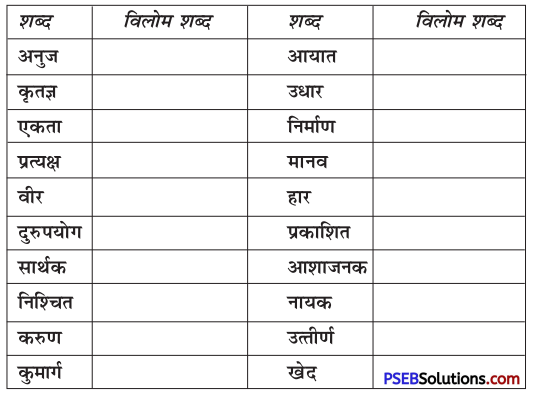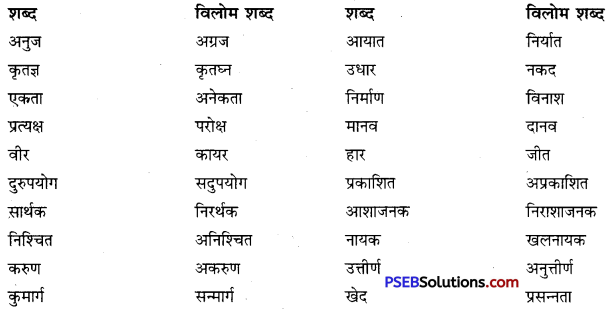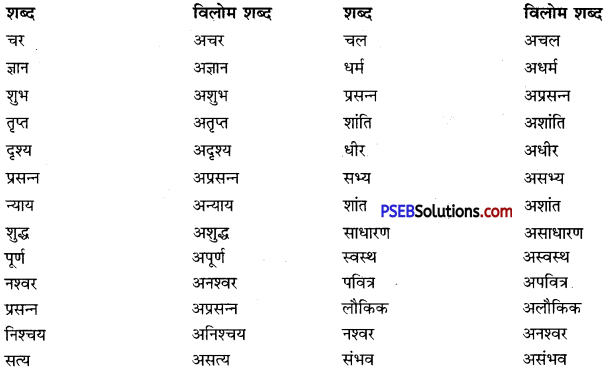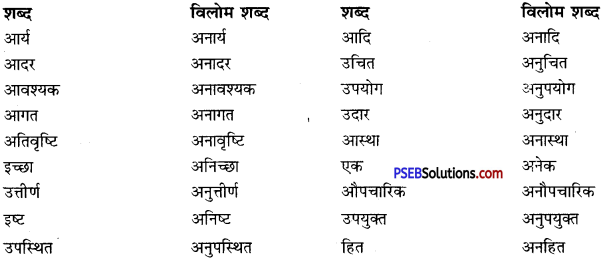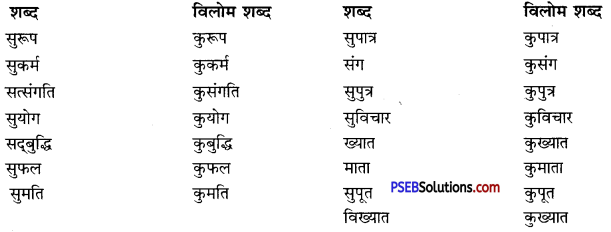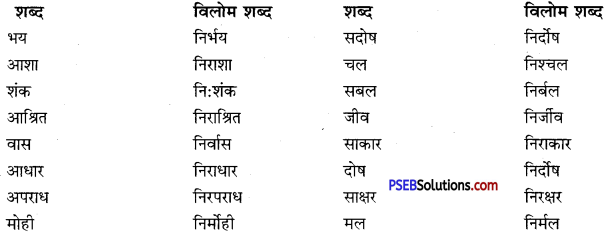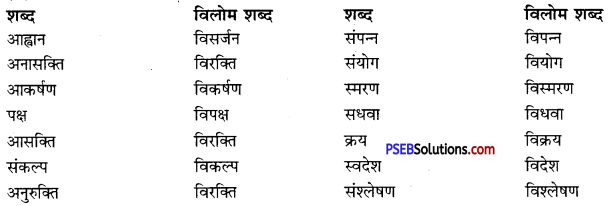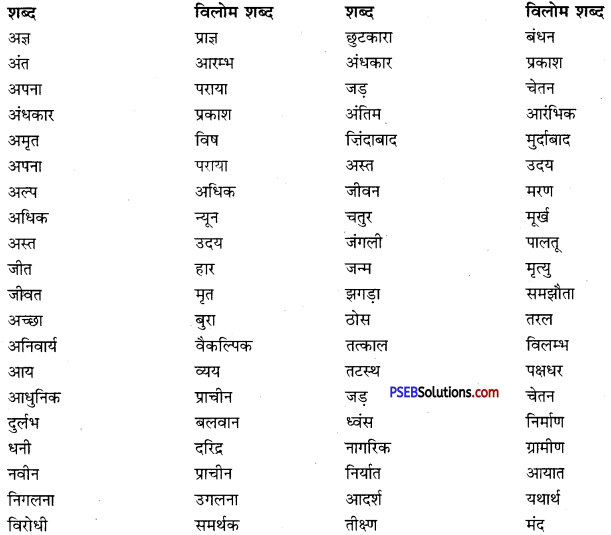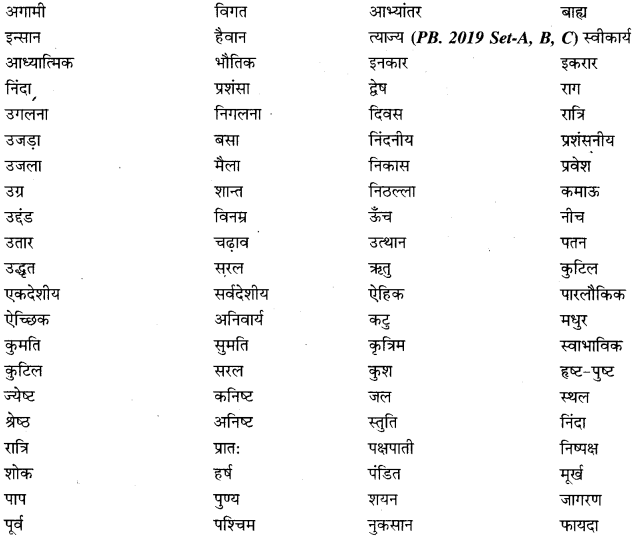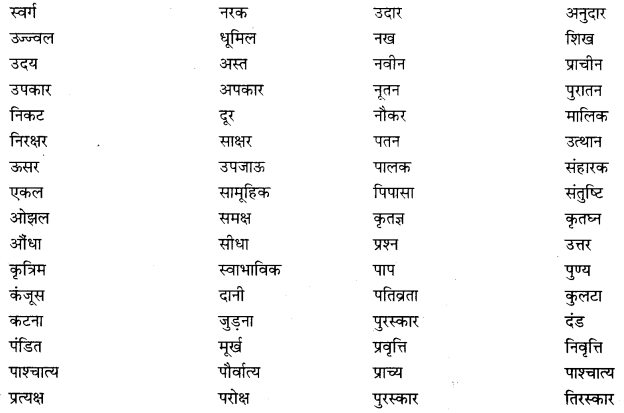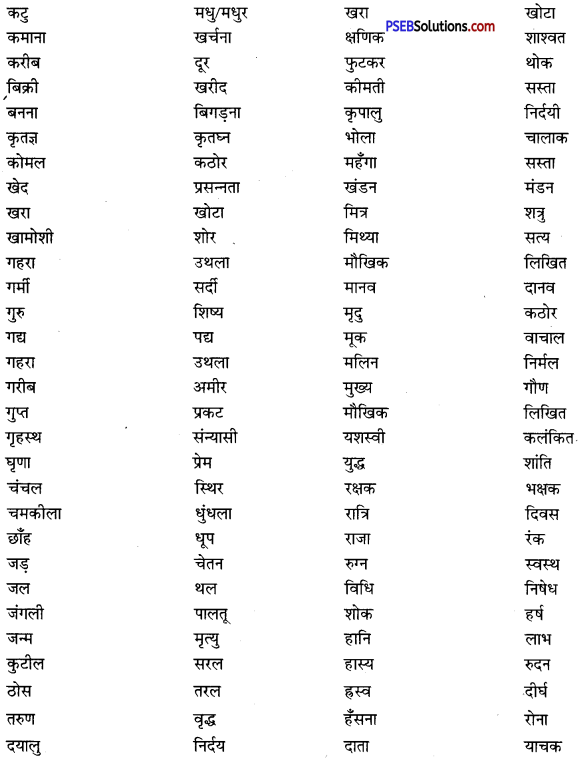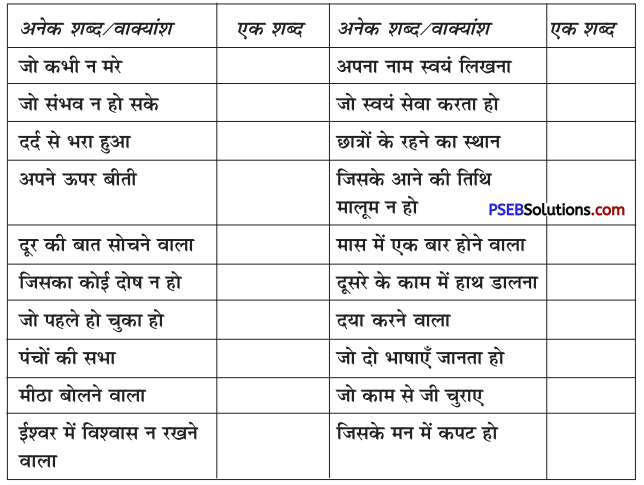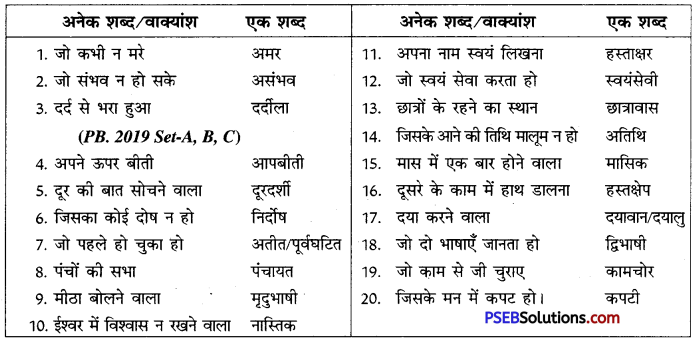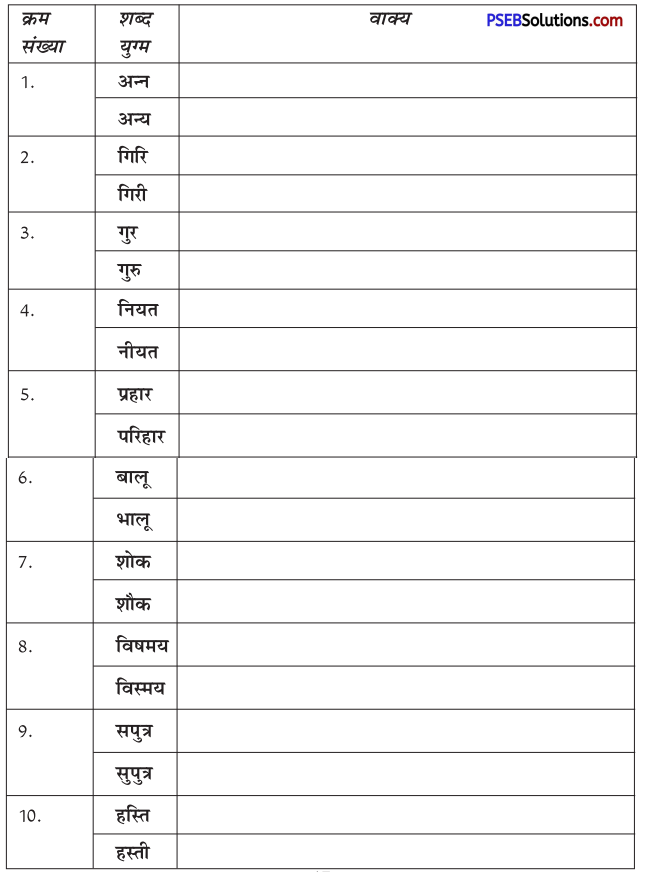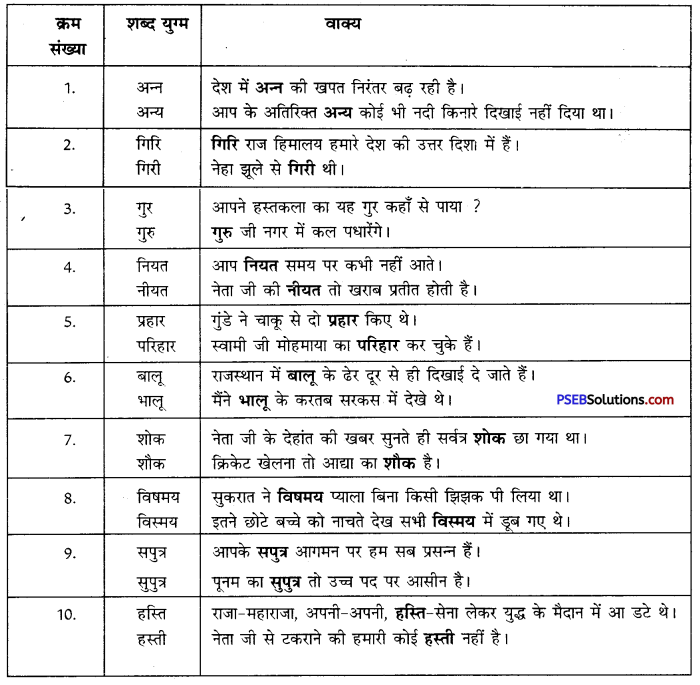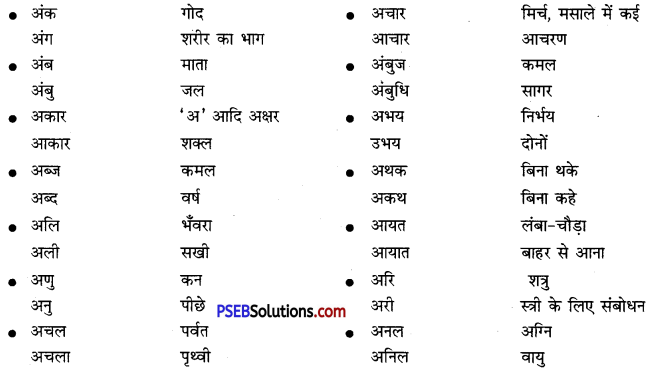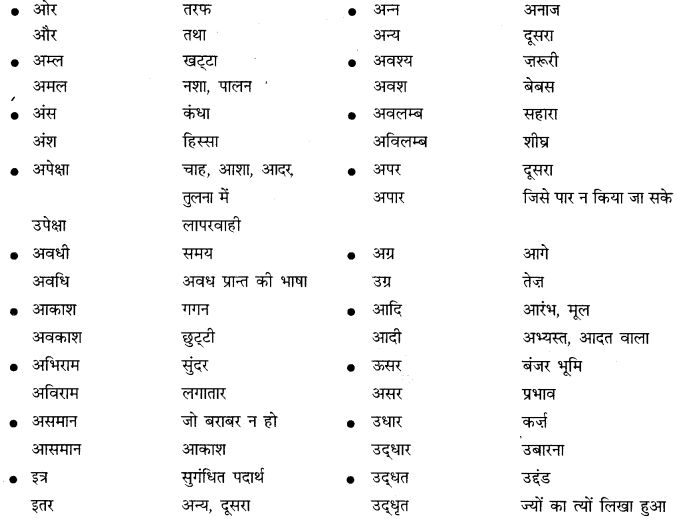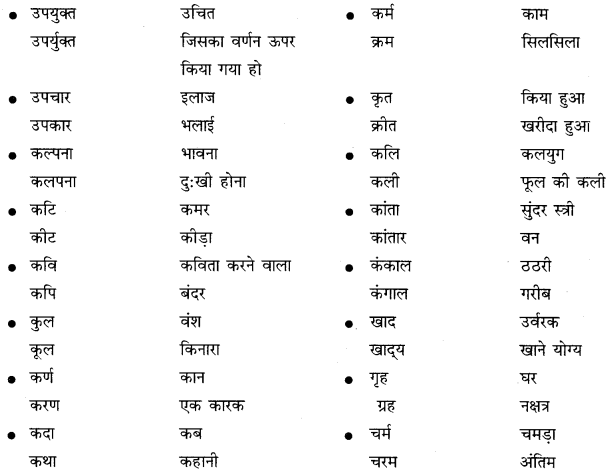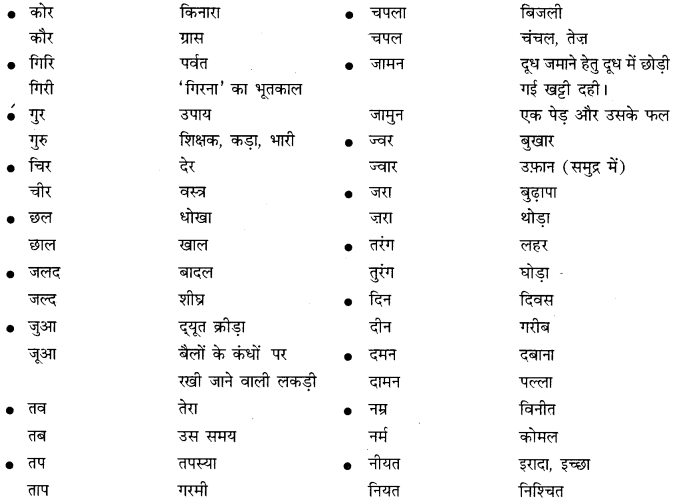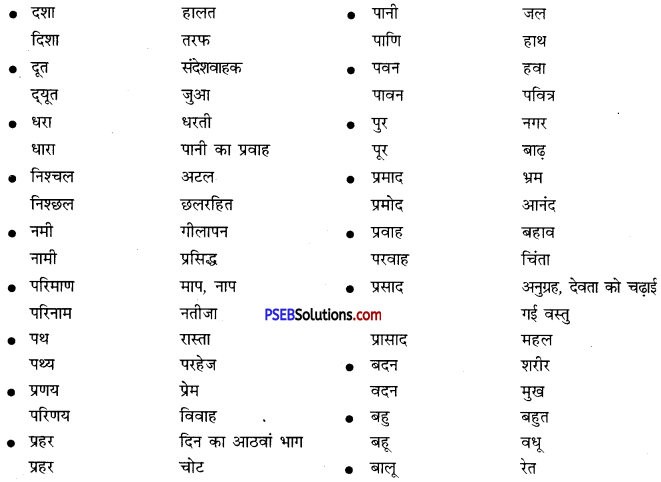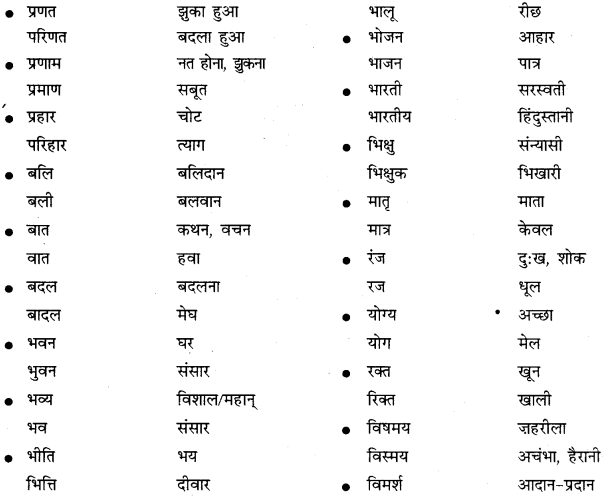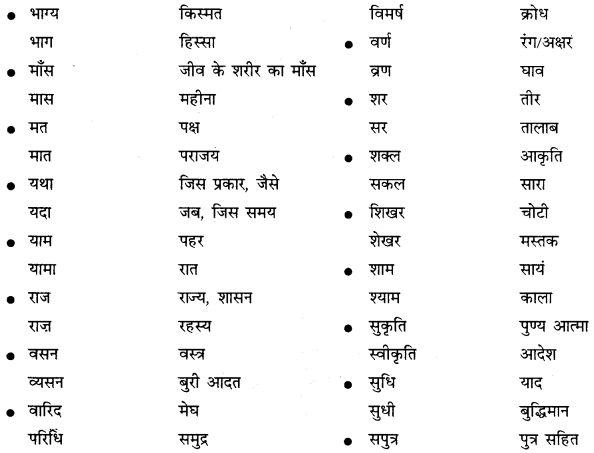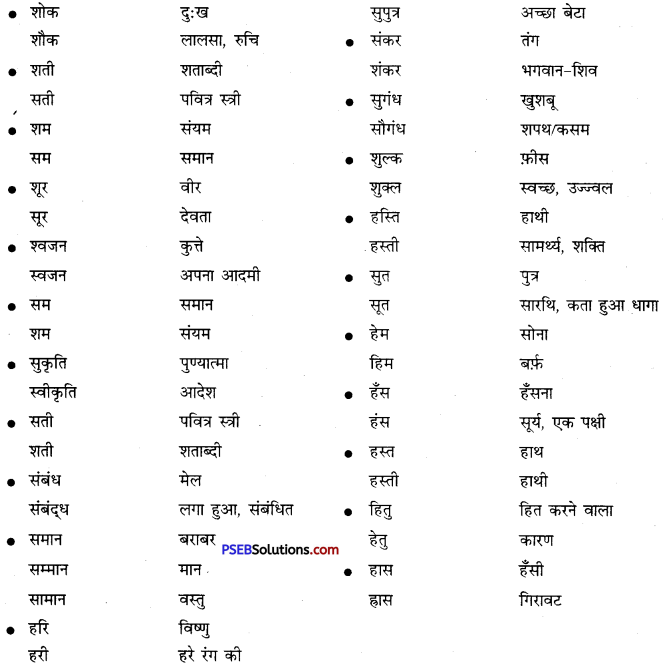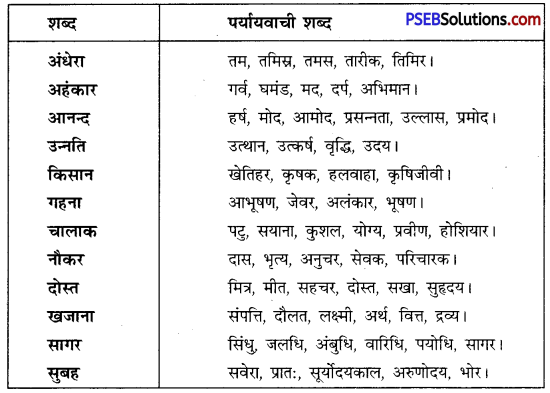Punjab State Board PSEB 10th Class English Book Solutions English Paragraph Writing Exercise Questions and Answers, Notes.
PSEB 10th Class English Paragraph Writing
नोट-परीक्षा-पत्र में विद्यार्थियों को तीन अथवा चार विषय दिए जाएंगे जिनमें से किसी एक पर उन्हें लगभग 100 शब्दों में एक पैराग्राफ लिखना होगा। ये पैराग्राफ किसी व्यक्ति, घटना अथवा अनुभव, आदि के बारे में पूछे जा सकते हैं। किसी विषय पर एक अच्छा पैराग्राफ लिखने के लिए निम्नलिखित बातों का ध्यान रखिए –
1. दिए हुए विषय पर चिन्तन कीजिए और इसके सम्बन्ध में जो बातें (points) आप लिखना चाहते हों, उन्हें क्रमबद्ध कर लीजिए।
2. पैराग्राफ लिखते समय इस बात का ध्यान रखिए कि आपके पैराग्राफ में एक सहज प्रवाह हो – अर्थात् पैराग्राफ का प्रत्येक वाक्य अपने पूर्व के वाक्य में से निकलता हुआ प्रतीत होना चाहिए।
3. अपने पैराग्राफ में केवल उन्हीं शब्दों का प्रयोग कीजिए जिनका अर्थ और प्रयोग आप को भली प्रकार आता हो। अपनी योग्यता से अधिक योग्य दिखलाई देने का यत्न कभी मत कीजिए।
4. अपने वाक्यों की लम्बाई इतनी रखिए कि वे आपके काबू में रहें। अधिक लम्बे वाक्य सुन्दर लेख का लक्षण नहीं होते हैं।
5. आपके पैराग्राफ का पहला वाक्य विषय का उल्लेख करने वाला होना चाहिए और अन्तिम वाक्य निष्कर्ष-पूर्ण होना चाहिए। आरम्भिक और अन्तिम वाक्य लिखने में विशेष ध्यान दिया जाना चाहिए।
6. आपका पैराग्राफ दिए हुए विषय पर ही केन्द्रित होना चाहिए। व्यर्थ की बातें लिखकर अपने पैराग्राफ को लम्बा करने का यत्न कभी मत कीजिए।
7. आपका पैराग्राफ संक्षिप्त तथा अर्थ-पूर्ण होना चाहिए। पुस्तक के इस भाग में अनेक विषयों पर पैराग्राफ दिए गए हैं। विद्यार्थियों को परामर्श दिया जाता है कि वे इन्हें ध्यानपूर्वक पढ़ें और देखें कि किस प्रकार से किसी विषय को एक सारगर्भित पैराग्राफ का रूप दिया जा सकता है।
1. An Indian Festival
Outline: Diwali…… twenty days…… Dussehra…… Shri Ram…… Ayodhya…… set free…… Mughal Emperor …… festival…… village and town…… houses and shops…… painted…… new colours…… candles and electric lights …… gifts …… fireworks…… worship goddess Lakshmi…… gamble…… evil…… ended.
Diwali is an important Indian festival. It generally falls in the month of November. It comes twenty days after Dussehra. Shri Ram came back to Ayodhya on this day. Shri Guru Hargobind was set free by the Mughal Emperor on this day. This festival is celebrated in every village and town. Houses and shops are painted in new colours. People light their homes with candles and electric lights. They buy sweets and toys. They distribute gifts among friends and relatives. Children enjoy fireworks at night. On this day, people worship goddess Lakshmi. Some people gamble on this day. It is an evil. It should be ended.
![]()
2. Good Manners
Outline : Good manners oil the machine of life ……… earn us respect ……… ‘please’and ‘thank you’settle bitter quarrels ……… should be observed respect elders ……… be polite to the younger ……… talk less and listen more ……… take turn in queue ……… civility of behaviour is a moral obligation ……… bad manners create bitterness.
Good manners oil the machine of life and keep it healthy. They are necessary in every walk of life. They are a double blessing. They give us inner joy and also keep others happy. They earn us respect also. So we should be courteous in our behaviour. We should respect our elders and be polite to younger ones. We should talk less and listen more. We should take turn in queue. We should never forget that civility of behaviour is a moral obligation. While bad manners create bitterness, good manners win us friends. Even simple words like ‘Please’ and ‘Thank you’ settle bitter quarrels. If we have good manners we can make journey of life successful not only for others, but also for ourselves.
![]()
3. My Motherland
Outline : India my motherland …… most people live in villages …… many big cities …… land of saints …… big country …… Himalayas …… Indian Ocean …… fertile land …… brave and wise people …… proud of my motherland.
India is my motherland. Most of the people here live in villages. There are many big cities also. Mumbai, Delhi, Kolkata and Chennai are some of them. India is a land of saints. It is the land of Kalidas, Kabir and Guru Nanak. India is a very big country. In its north, there are the Himalayas. They are the highest mountains in the world. The Indian Ocean is in its south. India is a land of big forests, lakes, valleys and rivers. They add to its beauty. The soil of India is very fertile. It gives us many kinds of crops. India is a land of lions, tigers and elephants. And Indians are brave and wise people. They are peace-loving people. I am proud of my country and its people.
4. Fashion Among Students
Outline : Students …… most of the time in front of the mirror …… very particular about clothes …… hairstyles …… show off…… inwardly hollow …… no attention to inner development…… a foolish trend.
Most of the time of students is spent in front of the mirror. They want to decorate themselves in such a way as to attract every eye. In their desire to look modern and attractive, they go crazy for new fashions. They dress themselves in the latest styles. With every change in fashion, their hairstyles also change. To be in the latest fashion seems to be the only care of our young boys and girls. They care so much for their exteriors that they have no time to attend to their interiors. They frequent the beautician for facials but never visit the library for books, journals or periodicals. If ever they carry some book or journal in their hand, that, too, is never meant for reading but merely for the sake of fashion. I hate these modern clowns.
5. Discipline
Outline : Discipline necessary …… house…… classroom …… assembly …… office ……playground …… without discipline confusion, disorder and chaos…… no work or progress possible without discipline …… training of mind.
Discipline is necessary in all walks of life. Any house without discipline will surely go to the dogs. A teacher can’t teach if his students don’t keep discipline in the class. The head of a family won’t be able to run his family if its members don’t maintain discipline. The members of an assembly must observe discipline if they are to do any good job. No office can function without discipline. Even in a playground, the players have to obey the rules of the game. They have to play under discipline. Without discipline, there is bound to be confusion, disorder and chaos. No work or progress is possible without discipline. It is discipline which enables a nation to march on the way to progress. It must be kept in mind that discipline can’t be enforced by law alone. It is training of the mind. It has to come from within.
![]()
6. A Small Family Is a Happy Family
Outline : Small family enjoys life …… food and clothes of their choice …… expenses limited …… enough money …… enough time …… enjoy luxuries of life.
A small family enjoys life to the full. The couple may enjoy the food of their choice. They can wear clothes of their liking. They have only one or two children. So their expenses are limited. They can enjoy life in any way they like. They have enough money to spend on the education and clothes, etc. of their children. They have a lot of time to look after their children. They can work hard and buy their own house to live in. They can enjoy luxuries of life. It is rightly said that a small family is a happy family.
7. Fast Food — a Health Hazard
Outline : Present-day life affects eating habits …… taken to fast foods …… such foods lose value and taste …… oily and spicy …… cause various diseases …… should not be eaten.
The present-day fast life has affected our eating habits also. We have taken to foods that can be cooked fast and eaten fast. But such food loses much of its value and taste. Fast foods are generally prepared at wayside eating stalls and cheap restaurants. They are ill-cooked. They are very oily and spicy. They can cause a number of ailments in our body. They can- give us ulcers and even cancer. Habit of taking fast foods is suicidal. It is in our own interest to give it up. Fast foods are junk foods and junk should be thrown away rather than be eaten.
8. A Scene at the Railway Station
Outline : I spend some time at the railway station …… like watching trains …… before the arrival of a train …… growing excitement and activity …… some in a great hurry …… some unhappy at the departure of loved ones s coolies run …… vendor boys move in and out of the train jostling and elbowing …… after the train has left platform gives a deserted look.
Last Sunday, I went to the railway station to receive a friend of mine who was coming from Delhi. I bought a platform ticket and since there was time for the train to arrive I thought of spending some time there. There was a lot of excitement and activity on the platform. People were in a great hurry to catch the train. After the arrival of the train some people, who had come to see off, were unhappy at the departure of their loved ones. The coolies were running. The vendor boys were moving in and out of the train. There was a great rush because of which there was a lot of jostling and elbowing. But after the train left, it was all quiet at the platform and the platform gave a deserted look.
9. The Scene at an Election Booth
Outline : The election day full of excitement …… my school …… polling centre …… lavish activity …… rush of voters …… cars, minibuses used to bring candidates from homes …… free drinks offered to voters …… polling officer enquired the names of voters verified identity cards …… after casting vote, ink mark put on, voter’s left forefinger …… booth closed at 4 p.m.
In our city municipal elections were held last month. Our school was chosen as the polling centre. There was a feverish activity on the day of polling. Everybody was full of excitement. Cars and mini buses were used to bring the candidates from homes. There was a great rush of voters. Free drinks were offered to the voters. Then the voters entered polling booth from one side. The polling officer enquired the names of the voters. He verified each voter by his/her identity card. Before casting the vote, the indelible ink mark was put on every voter’s fore-finger. After that, they went behind the curtain. There they pressed the button of the Electronic Voting Machine according to their choice. They came out from the other side after casting their vote.
![]()
10. Inauguration of the New Computer Wing of Our School
Outline: New Computer Wing…… inaugurated by Principal, Govt. Polytechnic College…… interesting and informative talk on computers …… new computer wing going to help the students.
The new Computer Wing of the school was inaugurated by Dr. Ravi Sharma, Principal of Govt. Polytechnic, Faridabad. On this occasion, a talk on computers and their use was organised. The talk was given by Dr. Arvind Sharma. His talk was very interesting and informative. He told the students about different kinds of computers and their use in our present-day life. He impressed upon the students to take maximum advantage of their new computer wing and gain some elementary knowledge about the working of computers. The new computer wing is going to help the students a great deal.
11. A Visit to a Book Fair
Outline : Organised by the local publishers …… held in Town Hall…… rich display of books …… large number of people …… series of competitions …… fair a great success.
A three-day book fair was organised by the local publishers and distributors of the city. It was held in the Town Hall from the 17th to the 19th of the month. There was a rich display of books on almost all subjects for school and college students. The fair attracted a large number of students, parents and other book-lovers. In order to make the fair attractive to students, a series of competitions were held for school students on each day of the fair. Students of all local schools could take part in these competitions. Prizes were given to the winners in painting, cursive writing and intelligence tests in science, maths and general knowledge. The fair was a ‘great success in so far as it aroused the interest of the students to read good and useful books.
12. Annual Inspection of Our School
Outline : Annual inspection last month …… few days before Principal called meeting …… students asked to decorate the school…… whitewashed and cleaned the classrooms …… won first prize.
Answer:
The annual inspection of our school took place last month. A few days before the inspection, our Principal called a meeting. All the teachers and the students took part in it. The Principal asked the students to lend a hand in decorating the school. We were asked to clean and whitewash our classrooms ourselves. The students gladly agreed to it. First of all, we removed all the benches and desks from our classroom. We took a broom and swept the room. Then we prepared some buckets of whitewash. We took a brush and whitewashed the walls. A ladder was used to whitewash the ceiling. Then we took some enamel paint. Two coatings of this paint were given to the doors and windows. After whitewashing and painting, we cleaned the floor. Lastly, we arranged the furniture. On the day of inspection, we won the first prize.
13. A Visit to a Hill Station
Outline : During…… last summer…… Mussoorie…… friends…… new experience…. number of visitors. …… foreigners…… atmosphere…… hustle and bustle…… very pleasant…… ‘Queen of Hills’. ……material life…… visit is still fresh….
During the last summer vacation, I visited Mussoorie with some of my friends. I had never been to Mussoorie before. So it was a new experience for me. There were a large number of visitors. The presence of foreigners and honeymooners lent an additional charm to the atmosphere. Everywhere, there was a great hustle and bustle. The weather was very pleasant. The scenery all round was very charming. The fir-clad hills presented a fine view. Rightly has Mussoorie been called the ‘Queen of Hills’. It transports one into a heaven of joy. It makes one forget about the worries of material life. We visited all the beauty spots in the neighbourhood of Mussoorie. The memory of this visit is still fresh in my mind.
![]()
14. Value of Newspapers
Outline : Newspapers …… our life …… well-informed …… give us confidence …… government…… wrong policies…… social purpose…… social evils…… help job-seekers…… suitable matches…… sons and daughters …… part and parcel….
Newspapers have an important place in our life. They keep us well-informed. They increase our general knowledge. They give us confidence. They tell us what is happening around us. They are the world’s mirrors. Newspapers guard our rights. They keep a check on the government. They bring to light the wrong policies of the government. Newspapers serve a social purpose also. They educate us against social evils. Thus, they help in reforming society. Newspapers help job-seekers also by advertising the vacant posts. They help parents in finding suitable matches for their sons and daughters. Truly, newspapers have become a part and parcel of modern life.
15. Science Fair in Our School
Outline : Inaugurated by the District Education Officer …… 120 items on display…… most of them working models …… showed newness …… everyone fascinated ?.. students explained with confidence …… teachers had worked hard …… appreciated.
A science fair was organized in our school auditorium on the 7th of this month. It was inaugurated by the District Education Officer. There were more than 120 items on display. Most of them were working models. Each model showed newness and innovation in the practical application of some scientific law. Everyone was fascinated to see the exhibits. Students explained with confidence the mechanism of each model. Both, the students and teachers, had worked very hard to make this fair a success. Their efforts were appreciated by all present.
![]()
16. A Scene of a Flooded Village
Outline : There…… heavy rains…… July …… got flooded…… three days…… shelter…… roofs…… crops were all washed …… cattle died …… water level kept rising …… would get drowned …… army men came…… boats to safety…… villagers …… homes.
There were heavy rains in the month of July this year. The village in which I live got flooded after it had been raining for three days and nights. There was knee-deep water in all the houses of the village. The villagers had nowhere to go to. They took shelter on the roofs of their houses. Their crops were all washed away. Many of their cattle died. It was a horrible sight. To make it worse, the water level kept rising hour by hour. The villagers began to fear that all of them would get drowned. But luckily, the army men came to our help. They ferried the villagers in their boats to safety. The flood subsided after five days. The villagers came back to their homes.
17. A Rainy Day
Outline : India ……….. land of varying seasons ……….. summer very hot ……….. rain brings relief dark clouds gather in the sky cool breeze ………..downpour children dance in rain ……….. streets flooded with water ……….. rain stopped cool weather……….. rainbow in the sky……….. people enjoy.
India is a land of various seasons. Here summer is very hot. Only rain brings relief. It was the month of July last year. One day, it was very hot. Men and animals were panting. All were perspiring. We longed for a shower of rain. In the afternoon, some dark clouds appeared in the sky. A cool breeze began to blow. Soon the whole sky was overcast with dark clouds and there was a heavy downpour. Streets and bazaars were flooded with water. Little children came out and played in the rain. The rain stopped after two hours. The weather became cool. A rainbow appeared in the sky after the rain. People enjoyed the cool weather.
18. Drug Addiction
Outline: Drug addiction very common among the youth …… causes…… neglect and harsh treatment …… frustration…… educational system.
Drug addiction is becoming very common among our youth. Perhaps the youth find this life too burdensome. As an escape from it, they take to drugs. Sometimes parents themselves become the cause of it. They are either too strict or have no time to attend to their children. The young ones feel neglected. Our purposeless system of education is also one of the big causes. When the youth fail to get any employment after 15-20 years of education, they get frustrated and take to drugs. Drug addiction has become a big social problem. There is no short-cut cure for drug abuse. We often complain that our youth are going wrong. But, we hardly do anything to understand their problems. The best way to keep our youth away from drugs is to use their energies in constructive ways. An employment-based educational system should be evolved.
19. Environmental Pollution
Outline : Living in polluted world …… air, water, food, etc. …… everything polluted ……scientists listed the dangers of environment pollution …… all governments worried…… man himself responsible …… use of fertilizers …… nuclear testing contaminating water …… several deadly diseases ….. an immediate control must.
Environment pollution is the greatest problem facing a man. We are living in a polluted world; where air, water, food, etc. everything upon which we survive is polluted. Scientists have listed down the dangers of environment pollution and the governments around the globe are worried about the same. In fact, man himself is responsible for such a situation. In his ignorance he has so far been destroying the wealth of nature, trees and forests. An immediate control is required to keep the environment free from pollution. More attention is being paid to afforestation. The unauthorized felling of trees is being checked. Scientists are developing methods to minimize the effect of smoke let out by our autos and chimneys.
![]()
20. Wonders of Science
Outline: Science…… this world…… marvellous changes…… life easy…… blessing for man…… our dreams into realities…… reduced human suffering…… medicine and surgery…… fatal…… many articles of daily use …… made…… comfortable.
Science has made man the master of this world. It has brought marvellous changes in man’s life. It has made our life easy and comfortable. It has, in fact, proved a blessing for man. It has translated our dreams into realities. It has brought revolution in the fields of agriculture, industry, transport and communication. Science has greatly reduced human suffering. Great progress has been made in the fields of medicine and surgery. Diseases once thought fatal can now be cured very easily. Science has given us many articles of daily use. These articles have made our life easy and comfortable.
21. Planting Trees
Outline: Trees…… in this world…… without trees…… man to live…… necessities of life…… purify the air …… beautify our surroundings…… the land safe from …… pleasant shade …… sun…… in his greed …… wealth of nature …… problems for mankind…… man’s own …… grow trees ….
Trees do more good to man than any other thing in this world. In fact, without trees, it would be impossible for man to live. They give us all the necessities of life. They give food for man. They purify the air. They help to bring rain. They beautify our surroundings. They give shelter to countless wild animals and birds. They keep the land safe from soil erosion. They give us pleasant shade from the heat of the sun. But it is very sad that man, in his greed, has destroyed this wealth of nature. It has resulted in many grave problems for mankind. It will be in man’s own interest to grow trees and look after them.
22. Life in a Village
Outline : The three words …… Simple, Pure and Fresh …… simple-hearted people …… thoughts and actions…… hospitable…. no anxiety…… calm and peaceful…… free from…… din of cities…… Says Leo Tolstoy …… A villager…… grow rich…… enough to eat…… worth-living.
The three words that can amply describe the life in a village are Simple, Pure and Fresh. The villagers are very simple-hearted people. They know no cunning. They are pure in their thoughts and actions. They are very hospitable. They live simply and happily. They have no anxiety. Life in a village is very calm and peaceful. It is free from the noise and din of cities. The air is fresh and health-giving. Says Leo Tolstoy in one of his stories, “A villager’s life is not a.fat one, but it is a long one.” A villager may never grow rich, but he has always enough to eat. In short, we can say that life in a village is worth-living.
![]()
23. An Ideal Citizen
Outline : Pride of nation …… duty comes first…… law-abiding …… pays taxes …… national outlook …… above the considerations of caste and creed…… works for national unity…… patriotism highest religion.
An ideal citizen is the pride of his nation. He is conscious of his rights and his duties. For him duty comes first. He knows that it is impossible to enjoy one’s rights without first doing one’s duty. He never forgets the duties that he owes to society. He is law-abiding. He obeys all the laws of the land. He pays all the taxes that are due to him. He has a truly national outlook. He is not narrow-minded. He is above the considerations of caste and creed. He works for national unity. Patriotism is the highest religion for him.
24. A House on Fire
Outline: It was Sunday…… with my friend…… saw clouds of smoke…… big fire…… running…… buckets of water…… sand and water …… after half an hour …… suffered a great loss …… grain and money…… People felt sorry …… gave him food, clothes …… carpenter thanked …… folded hands.
It was Sunday. I was sitting in my room with my friend. Suddenly, we saw clouds of smoke rising in the sky. There was a big fire. People were running to the site of fire. Children were shouting for help. People brought buckets of water. We also joined them. We threw sand and water on the flames. The fire was put out after half an hour. It was the house of a carpenter. The poor man suffered a great loss. All his wood, grain and money were gone. The house was reduced to ashes. He was very sad at his loss. People felt sorry for him. They gave him food, clothes and some money. The poor carpenter thanked them with folded hands.
25. My Hobby
Outline: My hobby…… reading books…… good and useful books…… knowledge ……pleasure…… great writers …… noble things of life…… best friends…… endless store …… food for the mind…… not very expensive…… borrow books from libraries.
Reading books is my hobby. I read only good and useful books. I read some good journals also. I get much useful knowledge from them. Reading gives me much pleasure. I can enjoy the company of great writers by reading their works. I can learn from them good and noble things of life. Good books are the best friends. They are an endless store of knowledge. We can learn much from them. They give us food for the mind. Reading books is the best of all hobbies. It is not very expensive. We can borrow books from libraries.
26. My Favourite Book
Outline: Many books…… “Gita’…… liked the most…… religious book…… philosophy…… work hard…… worry …… result…… certainly rewards…… leave the rest to God get peace of mind.
I have read many books. But I have liked one book the most of all. It is the ‘Gita’. It is a religious book of the Hindus. It has a very rich philosophy. It teaches us that man should work hard. He should not worry about the restful. God certainly rewards us for our work. Good work always leads to good results. So an man should only mind his work. He should leave the rest to God. I like this philosophy very much. I get peace of mind by reading this book.
27. My Best Friend
Outline: My best friend…… class-fellow…… lives next door tome ……go to school together…… intelligent…… captain of the tennisteam…… teachers love…… honest and sincere…… respects his elders…… polite to all…… poor and needy students…… true friend ……in the real sense…… friendly with him.
The person I like most is my best friend, Amit Kapoor. He is my class-fellow. He lives next door to me. We go to school together. We play and study together. Amit is very intelligent. He always stands first in the class. Amit is also good at sports. He is the captain of the tennis team of our school. All teachers love him. I like Amit for his good and simple habits. He always speaks the truth. He is honest and sincere. He respects his elders. He is polite to all. He helps the poor and needy students. He is a true friend in the real sense. Everybody wants to be friendly with him. I am proud of my friend. May he live long !
![]()
28. My Favourite Teacher
Outline: My favourite teacher…… active and smart…… M.A. B.Ed…. English…… method of teaching…… simple and effective…… ideal teacher…… real sense…… helps his students…… source of inspiration…… for the students…… proud of him…… live long
Mr. Ram Paul is my favourite teacher. He is my class teacher. He is forty years old. He is very active and smart. He is an M.A. B.Ed. He teaches us English. He is the master of this subject. His method of teaching is very simple and effective. His results are always good. Mr. Ram Paul is an ideal teacher in the real sense. He is ever ready to help his students. He helps the poor students with money and books. He is very kind to his1 students. He loves the students and the students respect him. He is a source of inspiration for his students. We are proud of him. May he live long !
29. Our School Library
Outline : A house of books …… big library …… big hall…… divided into four sections…… reading room …… 10,000 books …… newspapers and magazines …… students …… vacant periods …… read …… librarian …… issue books…… guides the students how to choose…… students can take…… after reading them.
A library is a house of books. There is a library in every school. There is a big library in our school also. It is housed in a big hall. The hall is divided into different sections. There is one section for each subject. There is a reading room also. There are about 10,000 books in our school library. The books are arranged on shelves. The newspapers and magazines are placed on the tables. The students go to the library in their vacant periods. They read books, newspapers and magazines there. The students love sitting in it. There is a librarian. He issues books. The students can take books to their homes also. They return the books after reading them.
30. The Morning Assembly of Our School
Outline: Students and teachers…… morning assembly…… stand in rows ……stand facing the assembly …… school compound …… head boy of school…… main news …… thought of the day …… explains it …… some important announcement…… go to classrooms.
Our school begins at half past eight in the morning. All the students and teachers reach the school in time. The morning assembly begins. All the students stand in rows in the school compound. They stand facing the school building. Four boys stand facing the assembly. First of all, there is the morning prayer. Then the head boy of the school reads out the main news of the day. A teacher gives the thought of the day and explains it. Sometimes our Headmaster makes some important announcement during the assembly. Then we go to our classrooms and the first period begins.
31. An Indian Farmer
Outline: An Indian farmer…… fields…… plough…… waters them …… sows seeds…… looks after crops…… no easy job…… very difficult and tiring…… remains poor…… hand to mouth …… lot is pitiable…… lives happily…… simple in habits ……pure in thoughts…… evils of city life.
The life of an Indian farmer is very hard. He has to work hard in his fields. He has to work in sun and rain. He has to plough his fields. He has to water them. Then he has to sow seeds in his fields. He looks after his crops day and night. Harvesting is also no easy job. It is very difficult and tiring. Even after so much labour, the Indian farmer remains poor. He has to live from hand to mouth. His lot is pitiable. But though he is poor, he lives happily. He is simple in his habits. He is pure in his thoughts. He lives away from the evils of city life.
![]()
32. An Indian Beggar
Outline: An Indian beggar…… common sight…… streets and bazaars…… railway stations…… in rags…… looks very dirty…… pretend to be lame…… painful voices ……pity …… money, clothes, flour…… don’t like…… poor homes…… work to do…… allowed to beg…… very ugly.
The Indian beggar is a common sight. We can see him anywhere and everywhere. We can see him in streets and bazaars. We can see him at bus stops and railway stations. He is always in rags. He looks very dirty. Some beggars pretend to be lame or blind. They cry in painful voices. People are moved to pity. They give them money, clothes, flour, etc. But I don’t like it. Beggars should be kept in poor homes. There they should be given work to do. Nobody should be allowed to beg in public places. It looks very ugly.
33. The Independence Day
Outline: India became free…… August 15,1947…… Indepdendence Day…… British rule…… red-letter day …… history of the country…… celebrated with great enthusiasm…… national holiday ……public meetings…… big function…… Prime Minister…… unfurls the National flag…… Red Fort…… hard-won freedom ……protect it.
India became a free country on August 15, 1947. So, August 15 is called the Independence Day of India. The British rule came to an end on this day. It is a red- letter day in the history of the country. It is celebrated all over the country with great enthusiasm. On this day all schools, colleges and offices remain closed. It is a national holiday. Public meetings are held in all towns and cities. A big function is held in Delhi. The Prime Minister unfurls the national flag at the Red Fort. Our freedom is a hard-won freedom. We should protect it.
34. The Republic Day
Outline : India became Republic…… Constitution came into force…… secular democratic …… power of government…… common people…… castes, creeds and religions…… equal…… red-letter day…… celebrated all over the country…… enthusiasm…… national flag unfurled…… public buildings…… big function…… Delhi…… President …… presides…… worth seeing…. national holiday.
India became a Republic on January 26, 1950. The Constitution of the country came into force on this day. India became a secular democratic country. The power of government passed into the hands of the common people. All castes, creeds and religions are to be equal in the eyes of the law. It is a red-letter day in the history of the country. It is celebrated all over the country with great enthusiasm. The national flag is unfurled at all the public buildings. A big function is held in Delhi. The President of the country presides over this function. It is worth seeing. This day is a national holiday.
35. A Football Match
Outline: Our school…… Khalsa School…… football match…… Sh. Jaswant Singh referee…… toss…… chose our side…… game slow ……played well…… our defence…… no goal…… blew the whistle…… interval…… Vinod passed …… the ball…… ran into the D…… kicked it hard…… goal…… loud cheers…… referee blew the whistle…… game was over…… won the match.
Last Monday, a football match was played between our school and Khalsa School. It was played on our school grounds. Sh. Jaswant Singh was the referee. He blew the whistle. There was a toss. We won the toss. We chose our side. The match began. At first the game was slow, but soon it became brisk. All the players played well. Our defence was very strong. There was no goal. The referee blew the whistle for interval. In the second half, Vinod passed the ball on to me. I ran with it into the D. Then I kicked it hard. It went through the poles. It was a goal. There were loud cheers. The referee blew the whistle. The game was over. We won the match by one goal.
36. Morning Walk
Outline: Morning walk…… best exercise…… costs nothing…… health…… refreshes …… saves from diseases…… develops…… habit…… pure thoughts…… dewdrops…… fresh flowers…… charm…… mind…… loving…… natural beauty …… not only…… body…… mind also.
Morning walk is the best form of exercise. It costs nothing. It is very useful for our health. It refreshes our mind. It strengthens our body. It saves us from many diseases. Morning walk keeps us fresh for the whole day. It develops in us the habit of rising early. It brings pure thoughts in our mind. The dewdrops, the fresh flowers, the chirping birds and the rustling leaves charm our mind. We start loving these objects of natural beauty. Thus, morning walk is useful not only for our body, but for our mind also.
37. A Visit to a Zoo
Outline :A zoo…… visited …… parents…… tickets…… saw birds…… rare kinds of…… herons, gulls…… wild beasts …… lioness and her cub…… basking…… wolves…… rhinos…… muddy pond…… big snakes…… fearful…… stayed there …… three hours…… came back home.
There is a zoo in our city. I visited it last Sunday. I went with my parents. We bought tickets and went in. First of all we saw birds. There were many beautiful and rare kinds of birds. We saw parrots, canaries, swallows, peacocks, ducks, cranes, herons, gulls and geese. Then we saw some wild beasts. A lioness and her cub were basking in the sun. They roared now and then. We also saw wolves, tigers, elephants and rhinos. When we were coming back, we saw a muddy pond. There were many big snakes in it. It was fearful to look at them. We stayed in the zoo for about three hours. Then we came back home.
![]()
38. Leisure
Outline : Life is not worth living if we remain busy in work ….. lot of energy wasted ….. restored by leisure ….. enjoy sights of nature develop new tastes and creative hobbies ….. busy men miss all this ….. overwork causes ailments….. make right use of leisure.
Leisure is the free or spare time one gets after one’s busy schedule. One must have some leisure to enjoy the sights of nature and to look after one’s physical, mental, moral, emotional and spiritual needs. A lot of energy is wasted in doing the day’s work. That energy is restored by leisure. All work and no play makes Jack a dull boy. It has been rightly said. During the leisure hours, we can develop new tastes as well as creative hobbies. All this is possible only if we have some leisure hours at our disposal. Busy men miss all this. Overwork and no rest causes ailments of various kinds. We should make the right use of leisure. This life is not worth living, if we always remain busy in work.
